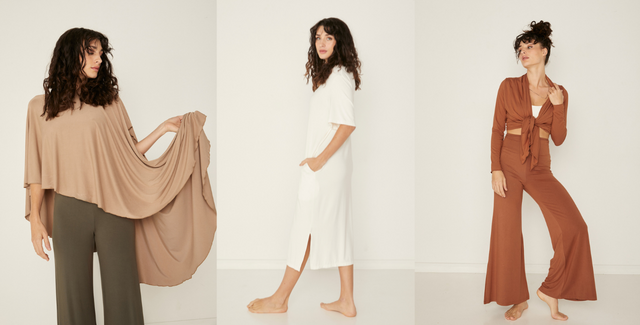Every year, the fashion industry produces 100 billion pieces of clothing, and 92 million tonnes of it end up in landfills. To give you an idea of how much that is, imagine a truck full of clothes ending up on landfill sites every second.
These alarming figures underscore the need for a change in how we produce and use clothing. As the effects of climate change worsen and consumers become more aware of their impact on the environment, there is a growing demand for the fashion industry to adopt practices that prioritise the planet and future generations.
This revolution is ethical fashion, and it's not led by designers, brands or even fashion icons — it's driven by you, the consumer.
What is ethical fashion?
Ethical fashion is a socially responsible approach to sourcing, designing, manufacturing and distributing garments. It aims to maximise benefits to consumers and workers while minimising the impact on the environment.
Being an ethical brand entails:
- Reducing environmental impact across the supply chain
- Upholding human and animal rights in textile and garment manufacturing
- Being transparent about manufacturing processes
- Empowering customers to make informed choices
How to tell if a brand is ethical
Discerning the truth behind marketing claims has always been challenging for consumers. To verify whether a fashion brand is truly ethical, it's essential to delve into the entire lifecycle of its clothing. This means examining not just the final product but every step of the process — from sourcing raw materials to waste management.
Here are practical steps you can take to assess whether a brand operates responsibly:
- Analyse supply chain transparency
Ethical brands typically disclose their suppliers and manufacturing processes. Consumers should be able to trace where materials come from, whether it's a specific farm for cotton, a mine for minerals or a forest for timber. Traceability guarantees that materials are not sourced from places with poor environmental practices or labour rights abuses.
In addition, ethical brands consider the environmental impact of sourcing materials. They avoid sourcing methods that contribute to pollution, water scarcity or deforestation. For instance, acquiring wood from sustainably managed forests ensures that the harvesting process maintains the forest's biodiversity and ecological processes.
- Consider the brand's commitment to animal welfare
No animal should have to suffer to make affordable, stylish and functional clothing.
For brands that use animal-derived materials like leather, fur or wool, it is crucial to ensure the humane treatment of animals within their supply chain. This includes providing adequate space, food, water and proper veterinary care to minimise stress and discomfort.
Independent assessments by animal rights organisations, ethical consumer groups or sustainability watchdogs can offer insights into a brand’s processes. Certifications are also a reliable way to quickly identify products that meet strict animal welfare standards. Check the brand’s website and product packaging for logos of cruelty-free and vegan groups.
- Research labour practices
Fashion brands must comply with international laws regarding the minimum age for employment and voluntary work. Additionally, every worker in their supply chain must receive fair wages that cover essential needs such as food, housing, education and healthcare for themselves and their families.
Fashion brands must also create humane working conditions, which means creating a safe and healthy environment for all employees. This involves providing sufficient breaks and time off, implementing proper safety measures and setting reasonable working hours that follow national and international labour standards.
Moreover, fair labour practices should be implemented. This includes treating all workers with respect and equity, regardless of gender, race, religion or sexual orientation. Workers should also have equal opportunities for employment, training and promotion.
The consumer’s role in promoting ethical fashion
Shifting towards ethical fashion is a collective effort. By making informed shopping choices and advocating for change, consumers can influence how garments are produced and sold.
Here are several ways shoppers can demand a more responsible fashion industry:
- Shop sustainable products
Prioritise purchasing from brands that are transparent about where and how their products are made, including details about the factories, the materials used and the treatment of workers.
- Stay educated
Learn about the issues within the fashion industry, including labour rights abuses, environmental degradation and animal cruelty. Sharing this knowledge with others through blogs, social media or word of mouth can raise awareness and influence purchasing habits.
- Demand transparency
Encourage brands to disclose information about their supply chains and workers’ rights. You can send questions through emails and feedback forms or social media to push for greater transparency.
- Advocate for responsible practices
Support initiatives and legislation that promote sustainable fashion, such as recycling programs, restrictions on hazardous chemicals or movements that combat workplace discrimination.
- Choose quality over quantity
Choose durable and sustainable products over fast fashion. Investing in timeless pieces, rather than chasing fleeting trends, not only saves you money and improves your style but also reduces the ecological footprint associated with clothing production and disposal.
- Leverage the power of social media
Technology and the internet make it easier to learn about brands and hold them accountable. Consider using social media to commend ethical practices, critique poor behaviour and converse with brands online.
Shop timeless and sustainable Bamboo clothing
Bodypeace Bamboo Clothing offers a range of Bamboo clothes for men and women that never go out of fashion. We’re committed to upholding high ethical standards throughout every stage of production, from growth, harvesting and processing to knitting, dyeing and the final garment production.
Explore our collection online or visit a Bodypeace store near you!









